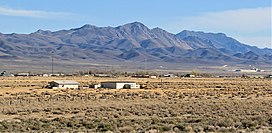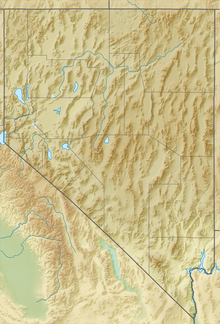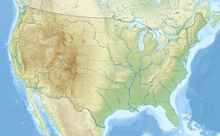Luxor Peak is a 7,420-foot elevation (2,262 m) summit located in Pershing County, Nevada, United States.
| Luxor Peak | |
|---|---|
 Northwest aspect, centered (Line parent Kumiva Peak to distant right) | |
| Highest point | |
| Elevation | 7,420 ft (2,262 m)[1] |
| Prominence | 1,170 ft (357 m)[2] |
| Parent peak | Kumiva Peak (8,238 ft)[3] |
| Isolation | 5.86 mi (9.43 km)[3] |
| Coordinates | 40°29′22″N 119°17′03″W / 40.4893468°N 119.2840718°W[4] |
| Geography | |
| Country | United States of America |
| State | Nevada |
| County | Pershing |
| Parent range | Selenite Range Great Basin Ranges |
| Topo map | USGS Kumiva Peak |
| Geology | |
| Mountain type | Fault block |
Description
editLuxor Peak is the second-highest peak of the Selenite Range which is a subset of the Great Basin Ranges.[2] This peak is set on land managed by the Bureau of Land Management. It is situated eight miles (13 km) south of Selenite Peak, six miles (9.7 km) north of line parent Kumiva Peak, and seven miles (11 km) south-southeast of the town of Empire. Topographic relief is significant as the west slope rises 2,000 feet (610 meters) in one-half mile. The large Empire gypsum quarry lies below the west slope of Luxor Peak. The Selenite Range was named for deposits of selenite, a variety of gypsum. This landform's toponym has been officially adopted by the U.S. Board on Geographic Names.[4]
Climate
editLuxor Peak is set at the southern edge of the Black Rock Desert which has hot summers and cold winters.[5] The desert is an example of a cold desert climate as the desert's elevation makes temperatures cooler than lower elevation deserts. Due to the high elevation and aridity, temperatures drop sharply after sunset. Summer nights are comfortably cool. Winter highs are generally above freezing, and winter nights are bitterly cold, with temperatures often dropping well below freezing.
See also
editReferences
edit- ^ United States Geological Survey topographical map - Kumiva Peak
- ^ a b "Luxor Peak, Nevada". Peakbagger.com. Retrieved 2022-08-27.
- ^ a b "Luxor Peak - 7,420' NV". listsofjohn.com. Retrieved 2022-08-27.
- ^ a b "Luxor Peak". Geographic Names Information System. United States Geological Survey, United States Department of the Interior. Retrieved 2022-08-27.
- ^ Peel, M. C.; Finlayson, B. L.; McMahon, T. A. (2007). "Updated world map of the Köppen−Geiger climate classification". Hydrol. Earth Syst. Sci. 11. ISSN 1027-5606.
External links
edit- Weather forecast: Luxor Peak
- National Geodetic Survey Data Sheet

